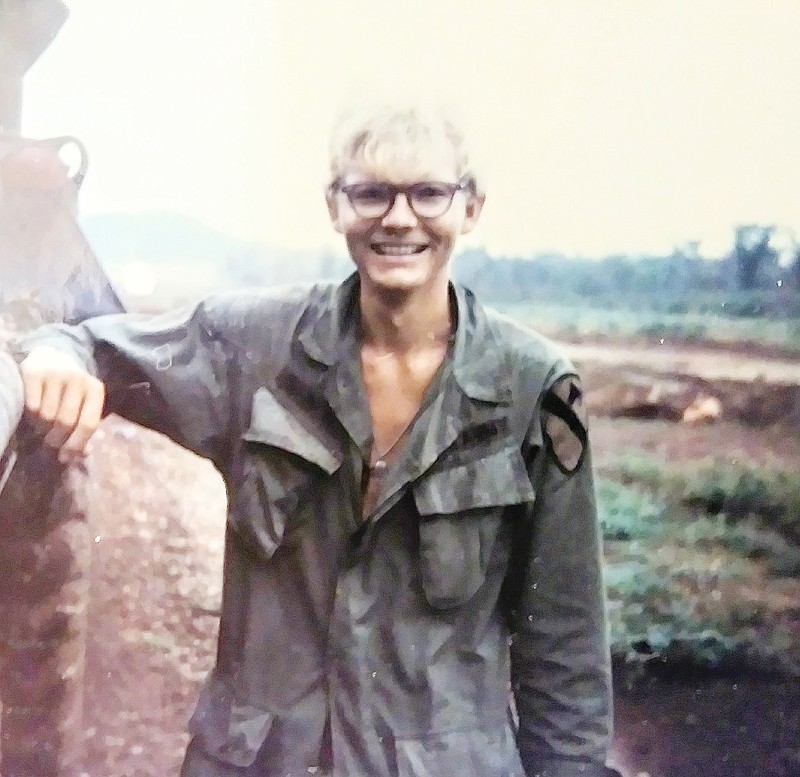Stephen Dunn is not one to boast of his military experiences. In fact, he is often hesitant to discuss his service in the Vietnam War.
A tumultuous period that found him in the heart of battle with an esteemed unit of the U.S. Army, the veteran would go on to receive the military's third-highest decoration for valor in combat, but remains modest when discussing his participation in the war.
A 1968 graduate of Russellville High School, Dunn spent the next year working a job until he received notice that it was his time to join scores of his fellow citizens drafted into military service.
"It was rather strange because I first got a notice that said 'you're drafted,' and then I got another one stating 'you're not drafted,'" he recalled. "Finally, I got another draft notice, and they were serious about it that time."
Completing his military entrance physical in St. Louis in early November 1969, the 20-year-old draftee was sent to Fort Leonard Wood to begin his basic training. While there, he returned home to St. Martins during the sixth week of his training since the post closed down for the Christmas holiday.
"While home, I had a hernia," Dunn recalled. "I contacted my training command, and they said to have it treated locally, so I did." He added, "I stayed home for about a month for recovery after surgery, and when I returned to the fort, they placed me in a training company that had just begun their second week, so my basic training was a little longer than most."
Graduating from boot camp in March 1970, the recently trained soldier was transferred to Fort Sam Houston, Texas, to train as a combat medic - a specialty for which he had no previous experience.
"That training lasted about 10 weeks if I remember correctly," the veteran said. "We learned how to give shots, bandage and carry the injured, apply tourniquets and morphine and anything regarding the care for someone wounded in a combat situation."
What happened next, he soon discovered, was the culmination of all the training he was given in previous weeks when he received orders to deploy to Vietnam. After 15 days of leave back home, he traveled to the West Coast to board an airplane, arriving in Vietnam in June 1970.
Assigned to Troop D, 1st Air Cavalry Division located at Phc Vnh Base Camp - a U.S. Army camp north of Bin Ha in southern Vietnam - Dunn began to ply his skills as a combat medic while accompanying his platoon in conducting security for convoys and combat assault missions.
"I carried my aid bag on my back and also packed a .45 (caliber pistol) and an M-16 rifle," he said. "Although I was trained as a medic, I also was there to fight if necessary and wanted all of the weapons that I could get.
"The enemy would be spotted in certain areas, and they would send us out to take care of them," he bluntly noted. "If you were to ask where I was, I couldn't tell you because we were just out there in the jungle somewhere; we were at several base camps and moved around a lot."
Seven months after arriving in Vietnam, recalled Dunn, he and his platoon were conducting a combat mission that resulted in his being wounded and the award of an unexpected recognition for valor.
On Feb. 2, 1971, Dunn was treating a fellow soldier injured during a firefight near Tai Ninh, South Vietnam. While focused on providing first aid, an enemy grenade exploded behind him, sending fragmentation throughout his body.
"I didn't know the grenade had been thrown and after it went off, I ended up with fragmentation in my arms, legs, hips and back," he said. "It's a good thing that I was wearing my medic bag on my back because it took most of it."
Despite his own injuries and the ongoing firefight, Dunn continued to provide medical treatment to the wounded soldiers. For his injuries, he was awarded a Purple Heart and, for his valorous actions in providing medical treatment while wounded in combat, he was awarded the Silver Star.
Dunn was evacuated to a field hospital and eventually transferred to the hospital at his previous training site of Fort Sam Houston, spending three months recuperating from his injuries. To this day, he carries with him much of the fragmentation from when he was wounded in combat.
Following his recovery, he transferred to Fort Hood, Texas, to finish out the remainder of his two-year obligation, receiving his discharge in late summer 1971. He returned to Mid-Missouri and went on to study electronics at the Linn Tech (now State Technical College of Missouri).
"Someone told me there'd be a lot of money in electronics they lied to me," he jokingly remarked.
He has since married Elizabeth, raised three children and retired from a local company, for whom he repaired electronic point of sale systems. As the veteran soberly explained, the years since Vietnam were focused on forgetting the carnage witnessed in the jungles far from home. However, a recent experience has demonstrated an appreciation for military service that is long overdue.
"As a Vietnam veteran, we were treated very poorly for a number of years and pretty much ignored when we got home," he stated. "But a couple of years ago, I was able to go see the war memorials in Washington, D.C., as part of the Central Missouri Honor Flight."
In gratified reflection, he added, "I'm not a very talkative person, but when I got the letters from my family during mail call, telling me how proud they were of me and my service, it was very touching. It was a very healing experience for me and many others who went."
Jeremy P. mick writes on behalf of the Silver Star Families of America.

